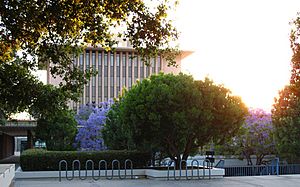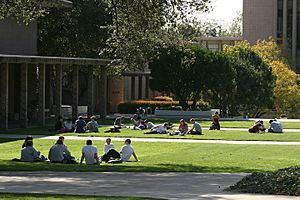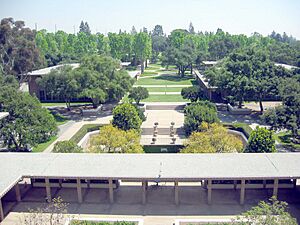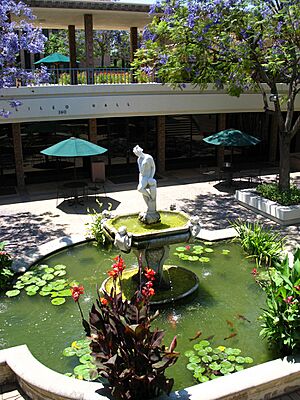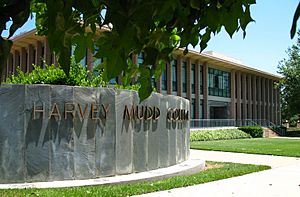Harvey Mudd College facts for kids
 |
|
| Type | Private liberal arts college |
|---|---|
| Established | 1955 |
|
Academic affiliations
|
Claremont Colleges NAICU Oberlin Group Annapolis Group CLAC |
| Endowment | $413 million (2023) |
| Budget | $72 million (2019) |
| President | Harriet Nembhard |
|
Academic staff
|
130 (2021) |
| Undergraduates | 905 (2021) |
| Location |
,
U.S.
|
| Campus | Suburban, 38 acres (15 ha) |
| Colors | Black & gold |
| Nickname | Stags (men) / Athenas (women) |
|
Sporting affiliations
|
NCAA Division III – SCIAC |
| Mascot | Official: Men's, Stag Women's, Athenas Unofficial: Wally the Wart |
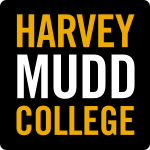 |
|
Harvey Mudd College (often called HMC) is a private college in Claremont, California. It focuses on science and engineering. HMC is part of the Claremont Colleges, a group of schools that share campus areas and resources. In 2021, about 900 students attended HMC. The college offers a Bachelor of Science degree.
The college was started by friends and family of Harvey Seeley Mudd. He was an early investor in a company called Cyprus Mines Corporation. Mr. Mudd helped plan the college, but he passed away before it opened in 1955. The campus was designed by Edward Durell Stone.
Contents
History of Harvey Mudd College
Harvey Mudd College first opened in 1955. Classes began in 1957 with 48 students and 7 teachers. They had one building, Mildred E. Mudd Hall, which was a dorm. Students took classes and ate meals at Claremont Men's College (now Claremont McKenna College). Science labs were in the Baxter Science Building.
More buildings were added later, like Jacobs Science Building (1959) and Platt Campus Center (1963). By 1966, the college had grown to 283 students and 43 teachers.
In 2006, Maria Klawe became the president. Under her leadership, Harvey Mudd became a strong supporter of women in STEM. This means encouraging more women to study science, technology, engineering, and math.
In April 2017, classes were paused for two days. This happened because students felt stressed about their schoolwork. They also had concerns about fairness and trust with some teachers. These feelings came after some sad events and a report about workload at the college.
On July 1, 2023, Harriet Nembhard became the sixth president of Harvey Mudd College.
Campus Life and Buildings
The first buildings on campus were finished in 1959. They were designed by Edward Durell Stone. These buildings have unique concrete squares that students call "warts." Students even use them to hang their skateboards! The college's unofficial mascot is "Wally the Wart," who is a cartoon concrete wart.
In 2013, Travel and Leisure magazine said the college was one of "America's ugliest college campuses." They noted that while the designer thought his work was a "Modernist masterpiece," the buildings looked "drab" with old-fashioned decorations.
Academic Buildings at HMC
Here are the names of the main academic buildings at Harvey Mudd College:
- F.W. Olin Science Center ("Olin") - built in 1992
- Parsons Engineering Building ("Parsons") - built in 1972
- R. Michael Shanahan Center for Teaching and Learning ("Shan") - built in 2013
- Jacobs Science Center ("Jacobs") - built in 1959
- W.M. Keck Laboratories ("Keck")
- Scott A. McGregor Computer Science Center ("Greg") - built in 2021
Student Dormitories
The dorms at Harvey Mudd College are:
- Mildred E. Mudd Hall ("East") - 1957
- West Hall ("West") - 1958
- North Hall ("North") - 1959
- Marks Residence Hall ("South") - 1968
- J. L. Atwood Residence Hall ("Atwood") - 1981
- Case Residence Hall ("Case") - 1985
- Ronald and Maxine Linde Residence Hall ("Linde") - 1993
- Frederick and Susan Sontag Residence Hall ("Sontag") - 2004
- Wayne and Julie Drinkward Residence Hall ("Drinkward") - 2015
- Garrett House - became a dorm in 2023
"East" was the first dorm built. But it was only called "East" after "West" was built to its west. Then "North" was built north of "East." When the fourth dorm, Marks Hall, was built, it was placed in the northwest corner of the campus. Even though it's in the north, it's called "South" dorm.
The dorms built later (Atwood, Case, Linde, Sontag, and Drinkward) are sometimes called "the outer dorms." The first four are called "the inner dorms."
Students from any year can live in any dorm. Because of this, many dorms have their own traditions and unique "personalities." Once, during the building of Case Dorm, some students played a prank. They moved all the survey stakes exactly six inches in one direction!
Academics and Learning
HMC offers four-year degrees in many science and math fields. These include chemistry, mathematics, physics, computer science, biology, and engineering. Students can also choose special combined majors. For example, they can study computer science and mathematics together.
All students at HMC must take a "Common Core Curriculum." This usually happens during their first two years. It includes classes in computer science, engineering, biology, chemistry, physics, and math. It also covers writing and critical thinking.
In 2023, the most popular majors for graduates were:
- Computer Science
- Engineering
- Computer Science & Mathematics
- Mathematics
In 2018, the Chronicle of Higher Education reported on student concerns. The college was looking at ways to help students feel less stressed. They wanted to do this without making the classes less challenging.
How to Apply to HMC
For the class that started in 2022, Harvey Mudd received 4,440 applications. They accepted 593 students, which is about 13.4% of applicants. Of the 237 students who enrolled, most had very high scores on the SAT or ACT tests.
For a long time, Harvey Mudd only accepted SAT scores for admission. But in 2007, they started accepting ACT scores too. Because of the COVID-19 pandemic, Harvey Mudd made SAT or ACT scores optional for several years. This policy was extended for students applying for the classes of 2023 and 2024.
The college is "need-blind" for students from the U.S. This means they decide if you get in without looking at whether you need financial help.
College Rankings
| USNWR Liberal Arts College | 29 |
|---|---|
| Washington Monthly Liberal Arts | 2 |
| Forbes | 184 |
Washington Monthly magazine ranked Harvey Mudd second among liberal arts colleges in the U.S. in 2024. This ranking looks at how much colleges help the public good. This includes things like helping students from all backgrounds and doing important research.
U.S. News & World Report ranked Harvey Mudd College as one of the top liberal arts colleges in the U.S. in 2025. It was also ranked third among undergraduate engineering schools. Forbes magazine rated it 23rd in its "America's Top Colleges" list in 2019.
Harvey Mudd is also ranked first nationally for how much students earn after graduation. This is called "Return on Investment."
Cost of Attending Harvey Mudd
For the 2024–25 school year, the total cost to attend Harvey Mudd was about $93,131. This includes tuition, fees, and living expenses. About 70% of new students receive financial aid to help pay for college.
Student Life and Activities

Sports at HMC
Students from Harvey Mudd play sports with students from Claremont McKenna College and Scripps College. Their combined teams are called the Claremont-Mudd-Scripps Stags and Athenas (CMS). They compete in NCAA Division III sports. The men's teams are called the Stags, and the women's teams are the Athenas. Their team colors are cardinal and gold.
In 2016–2017, CMS was ranked 12th among all Division III sports programs.
Another sports team in the Claremont Colleges is the Pomona–Pitzer Sagehens (PP). This team is made up of students from Pomona College and Pitzer College. They are CMS's main rival, and their games are known as the Sixth Street Rivalry.
Sports Facilities
- Baseball — Bill Arce Field
- Basketball and Volleyball — Roberts Pavilion
- Football and Lacrosse — John Zinda Field
- Softball — Softball Field
- Soccer — John Pritzlaff Field
- Aquatics — Matt M. Axelrood Pool
- Tennis — Biszantz Family Tennis Center
- Track and Field — Burns Track Complex
Fun with Caltech
The California Institute of Technology (Caltech) is another university known for science and engineering. It is about 26 miles away from Harvey Mudd College. Students from Harvey Mudd sometimes play pranks on Caltech.
For example, in 1986, Mudd students stole a large memorial cannon from Caltech. They dressed up like maintenance workers and took it away on a truck for "cleaning." The students eventually returned the cannon after Caltech threatened legal action. In 2006, students from Massachusetts Institute of Technology (MIT) did the same prank and moved the cannon to their campus!
Famous People from Harvey Mudd
Here are some notable alumni who went to Harvey Mudd College:
- Donald D. Chamberlin, who helped create SQL (a computer language)
- Jonathan Gay (1989), who created Adobe Flash software
- Jennifer Holmgren, CEO of LanzaTech (a company that makes fuel from waste)
- Richard H. Jones, a diplomat and U.S. ambassador
- Stan Love, an astronaut
- George "Pinky" Nelson, an astronaut
- Sean "Day9" Plott, a famous esports commentator and game designer
- Tom Preston-Werner (left before graduating), who helped start GitHub
Presidents of Harvey Mudd College
Here is a list of the people who have served as president of Harvey Mudd College:
| # | Image | Name | Term start | Term end | |
|---|---|---|---|---|---|
| 1 | Joseph Platt | 1955 | 1976 | ||
| 2 | D. Kenneth Baker | 1976 | June 30, 1988 | ||
| 3 |  |
Henry E. Riggs | July 1, 1988 | February 28, 1997 | |
| 4 | Jon C. Strauss | March 1, 1997 | June 30, 2006 | ||
| 5 |  |
Maria Klawe | July 1, 2006 | June 30, 2023 | |
| 6 | Harriet Nembhard | July 1, 2023 | present |
See also
- Association of Independent Technological Universities
 | Selma Burke |
 | Pauline Powell Burns |
 | Frederick J. Brown |
 | Robert Blackburn |


